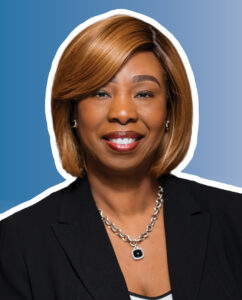Meet Our Team: Q&A with SVP of Talent Management, Charity Hughes
 How did you become interested in working in healthcare, more specifically, healthcare and human resources? Why did you choose this path?
How did you become interested in working in healthcare, more specifically, healthcare and human resources? Why did you choose this path?
Interesting enough, when I first graduated from college, we were in the middle of a recession. There simply weren’t a lot of jobs. I finally landed a job at Independence Blue Cross here in Philadelphia. They were just starting a new kind of subsidiary, AmeriHealth at the time – this was before AmeriHealth was a standalone – and they needed member service representatives. Since I needed a job, and I couldn’t find anything in my field yet, I started in member services. I was responsible for any call that came into my line; it could have been a call about benefits, enrollment, eligibility, or claims. Responding to so many questions helped me understand the full scope of how benefits work. At that time, we still serviced traditional indemnity plans and managed care was starting to grow in popularity. I stayed on the phone lines for about a year.
From there I moved to quality assurance, finding opportunities to develop and train the member service reps, which eventually led me to a training role, and that’s where I really found my niche.
So, I would say that I started my HR career somewhat haphazardly, but that start was important because it was the combination of benefits knowledge and learning how to train and engage people that I learned early on that got me started on this path.
What brought you to Sellers Dorsey?
I’ve had a pretty long career; I’ve gone in and out of different industries and different roles. What brought me to Sellers Dorsey was my last position. At the time when Sellers Dorsey was looking for an HR leader, I was working in education as the Chief Talent Officer for Mastery Charter Schools. I was working with a recruiter to fill one of our roles and she sent me a message asking if I knew anyone who would be interested in a different position (at Sellers Dorsey). I thought to myself, I’m interested in this; it sounds kind of exciting. I loved what I was doing in education, but when the opportunity came across my desk, I jumped at it!
What is your superpower and what is your kryptonite?
My superpower, I think, is my ability to listen intently, to listen with curiosity, and also to listen for what’s not actually being said. My kryptonite? Injustice. When I see that, or when I experience that, it often takes me to a place where I don’t want to be, and I have to be very conscious about how I’m going to show up in that space and time in order to create an environment that supports restorative practices
What would you consider your greatest achievement in your career thus far?
I have had the opportunity to either lead or participate in some really, really wonderful and transformative things, but I would say for me personally, it was actually achieving my Ph.D. For several reasons really. One, because it was just something I always wanted to do, to get a terminal degree. But two, when I look at the percentage of African Americans, particularly African American women, we represent only around 4% of the entire population of Ph.D. holders. So, to know that I’m one of such few that have been able to achieve such an accomplishment is meaningful.
Beyond that, at the time I was pursuing my degree there were so many other life events happening that could have easily made me pause or give up, but I was able to push through and finish. And even though it took me a little more time than I would have liked, walking that stage and earning that degree – for me – that has been my greatest accomplishment especially since my mother was able to see me receive my degree before she passed.
What is the most rewarding aspect of working in your field?
For me, it’s creating a structure that enables employees to feel more empowered. With what I said about my kryptonite being injustice, injustice happens under a veil of secrecy; if you can make things more transparent, more open, then you empower people to make decisions that they might not otherwise be able to make. You may not agree with those decisions, but at least they feel empowered, and they feel a sense of agency.
So, I think the work we’ve done in compensation, in job alignment – the work we’ve done in training and development to make things more transparent and to provide an opportunity for people to feel more empowered regarding their career and the choices they make – for me, I think that’s been the most rewarding.
With the increasing importance of impact and transparency in the healthcare space, what does healthcare impact mean to you?
To me, it means the opportunity to save lives. It means the opportunity, even if a patient is terminally ill, to extend their life and to improve their quality of life. It’s reaching those who have typically not been able to access healthcare or only had access to subpar healthcare. For me, the work that we do, the impact that we have, is really about sustaining lives at a time when it is often so difficult for people to get the healthcare access, quality, and outcomes that they need for themselves and their families. While we may not deliver direct patient care, we help our clients find the resources they need to deliver quality care.
What is one fun fact that people would be surprised to learn about you?
My husband is my high school sweetheart.
What was your very first job?
My first hustle or my first job? My first hustle was doing hair in college because people could not afford to go to the hairdresser, and I had spent so much time growing up in hair salons. I learned how to cut my own hair. So, people were like “You cut this?” and I said “Yep!” and started cutting other people’s hair. So that was my first hustle. My first job was as a cashier at Express.
What is your favorite thing to do outside of work?
I would say two things; I’m very connected to my church community, so going to church and traveling are my two favorite things to do.
Name your all-time favorite movie or book?
My favorite book is probably not a really obvious one, but I’m going to say Lincoln on Leadership; it’s about Lincoln during the leadup to the Emancipation Proclamation. The author explores Lincoln’s mindset and evaluates his actions through the lens of leadership.
Want to learn more about Charity’s role at Sellers Dorsey?
Discover how she drives meaningful impact for our clients and employees.

